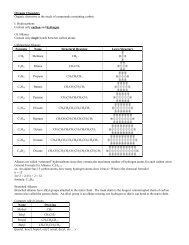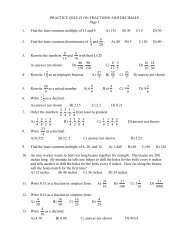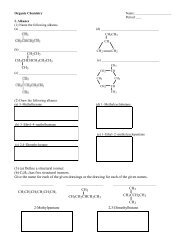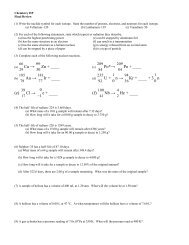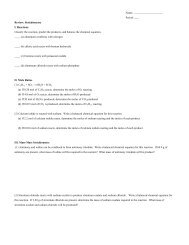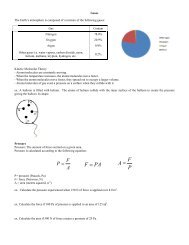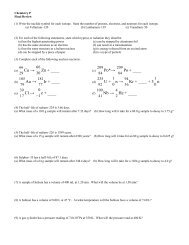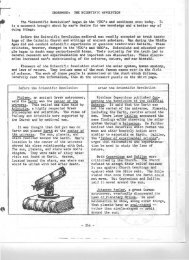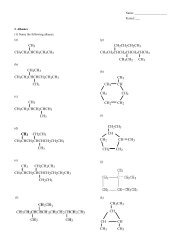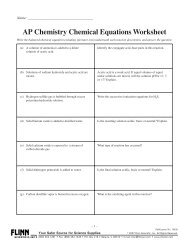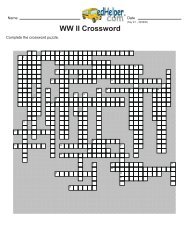- But this time [b/c 2 Northern justices threatened to dissent] the SC took on the case, finally deciding inMarch 1857 that: (1) Scott was not a US citizen and therefore couldn’t sue, (2) residence in free territorydidn’t make him free and (3) Congress couldn’t ban slavery from any territory anyway. This was a big timevictory for the Slave Power, and stimulated all sorts of <strong>com</strong>plaints and protests from the North.- This is where the famous Abraham Lincoln speech <strong>com</strong>es in…in 1858, while announcing his campaignfor US Senate, he talked about the divided house and all that. Since the DS decision had made theRepublican position unconstitutional, they could only appeal to voters’ overriding morals or hope to changethe SC justices – actually, they used both and it ended up helping them politically.- But for Northern Democrats [ex. Stephen Douglas] the case was a big problem – they had to reassure theNorth about the territories being opened but not scare off the South. Douglas ended up decided to stickw/PS, e/t it ticked off the South.- One incident involved the Le<strong>com</strong>pton Constitution, which had been drafted in Kansas but voted down.Still, Buchanan tried to force it through – infuriating the North and finally causing Douglas to side against theadministration [no LC] and against the South. Douglas only made it worse for himself by continuing his PSidea [Freeport Doctrine] in his debates against Lincoln for the Senate seat in 1858.- Things like this made the possibility of a split in the Democratic Party increase.*John Brown and the Election of 1860*- Although slavery was a big deal, most people weren’t thinking about it 24/7…until John Brown gave it awhole new slant with his attack on the federal arsenal at Harpers Ferry on October 16, 1859.- Brown was an obsessive abolitionist, and his capture and execution made him a symbol of all evil forSoutherners and an almost holy martyr for much of the North.- So things were clearly pretty hyped up for the Presidential Election of 1860, which many felt woulddecide the fate of the Union. It was totally sectional, as even the Democratic Party had split at its 1860 SCConvention b/c Douglas refused to accept the Southern position on the territories.- As a result, the Democrats had Douglas [North] and John C. Breckinridge [South] up against theRepublican candidate, Abraham Lincoln. There was also a Constitutional Union Party, which supportedJohn Bell of Tennessee.- Lincoln ended up winning via the electoral college, but the losers refused to accept the results for a whileas Lincoln didn’t have a majority in the popular vote [he wasn’t even on the ballot in 10 slave states].*Secession and the Start of the War*- There was one very last attempt at <strong>com</strong>promise tried in the winter of 1860/1861 by Senator John J.Crittenden of Kentucky [Clay wannabe], but it didn’t work out as Lincoln wouldn’t agree to just split theterritories back at the Missouri Compromise line [too late for that]. So that was that and…- On December 20, 1860 South Carolina passed a secession ordinance, hoping that other states wouldfollow, which they did [Mississippi, Florida, Alabama, Georgia, Louisiana and Texas all split by February1861, when the Confederate States of <strong>Am</strong>erica was formed in Alabama]. And so it all began…The Civil War (1861 – 1865)*North vs. South: Advantages and Disadvantages*- The North obviously had several advantages, such as: An industrialized market economy that gave the government a tremendous amount ofresources to fall back on. A much larger population and more manpower for the army and navy. Speaking of the navy,the North had a larger, stronger navy. An already established, relatively powerful and organized central government led by Lincoln. The support of the liberated/runaway slaves in the South.- However… They mainly ended up having to invade “foreign” territory. They had really crappy generals (especially initially) like McClellan, Burnside, etc. To win, they had to invade and conquer the South (fighting an offensive war) – harder.- The South had some advantages, too: Fighting on home soil (most of the time) for their independence and way of life. They had some really good generals like Robert E. Lee, “Stonewall” Jackson, JEB Stuart, etc. To win, they only had to keep the North out – keep up resistance – like Washington in RW.- However…36
They had a smaller everything: smaller population, smaller army, smaller navy, smallereconomy, practically NO industrialization to speak of, and fewer resources.They had a developing central government and a big time aversion to gov’t power.Class problems emerging (in North too, but more in South) i.e. yeoman farmers vs. planters.*General Strategies*- The Union had the Anaconda Plan from the very start, which hoped to strangle the Confederacy through ablockade and cut it in half by taking the Mississippi.- The Confederacy only wanted to hang on and keep the Union from gaining control. To do this, they had theforeign policy goal of gaining foreign recognition (esp. Britain). To try to coax the British into supportingthem, the South put an embargo on cotton production, but this didn’t work as the British got cotton fromother sources.- In response, the North was very careful in trying to maintain good relations w/Britain. There were only twoinstances where this was threatened – the Trent affair in 1861 [US boards British steamer, takes off 2Confederate ambassadors, imprisons and then releases them] and the Alabama issue [Britain sellingwarships to Confederacy, ambassador protested, Britain stopped].- The one area both sides didn’t pay attention to initially was the West. Guerrilla warfare broke out there in1861, and locations along the rivers in the West would eventually be keys to the North’s victory. Beyond theMississippi, the Confederacy allied itself w/some Indian tribes.*The War Begins*- On December 20, 1860 South Carolina passed a secession ordinance, hoping that other states wouldfollow, which they did [Mississippi, Florida, Alabama, Georgia, Louisiana and Texas all split by February1861, when the Confederate States of <strong>Am</strong>erica was formed in Alabama].- Then on April 12, 1861 at Fort Sumter Confederate <strong>com</strong>manders attacked after being notified by Lincolna ship was arriving to resupply the fort. The fort surrendered, the war began, and four more states joined theConfederacy – Virginia, North Carolina, Tennessee and Arkansas.- The next battle took place on July 21, 1861 at Bull Run – to the shock of the Union picnickers watchingthe battle, General “Stonewall” Jackson sent Union troops fleeing back towards Washington.- In the last half of 1861 the only changes were really made in the sea, where the Union won some coastalvictories, setting off a stream of runway slaves in the nearby areas.*1862: Initial Battles*- In February 1862 Ulysses S. Grant won some important victories for the Union in the land and rivers ofTennessee at the battles of Fort Henry and Fort Donelson. These triumphs opened paths into Tennessee,Alabama and Mississippi.- Grant continued into Tennessee, fighting the first super-bloody battle of the war, the Battle of Shiloh, onApril 6. Neither side won, but casualties for both sides were huge.- On the Virginia front, McClellan was stalling for time (not in favor of all out war, liked preparing armies, notusing them). Although he was w/in 7 miles of the Confederate capital by June 1, Lee kicked his butt in theSeven Days Battles (June 26 – July 1) and sent him back to the James River.- Lee’s victory psyched Jefferson Davis up, and he ordered a general offensive (while at the same timecalling for the support of the border states).- But the plan didn’t work, largely b/c of the Battle of Antiedam (the bloodiest day of the entire war) onSeptember 17, 1862, where McClellan turned Lee back out of Maryland (but was subsequently replaced byLincoln for not going after the enemy more). The South also lost in Tennessee, and had to give up theoffensive due to a lack of resources.- Another noteworthy battle of spring 1862: the Merrimack (Confederacy) vs. Monitor (Union) deal, which isimportant b/c it was the first clash of ironclad ships (ever).*The Initial Effects of the War*- The North changed a great deal during wartime… Although business was shocked by the advent of the war [relationships w/South terminated,debts lost, etc.] it soon picked up – especially b/c the gov’t contributed formerly unheard ofamounts [and added new taxes, like the first in<strong>com</strong>e tax, to make up for it]. The<strong>com</strong>mercialization and industrialization of agriculture received an especially big boost.37
- Page 3 and 4: Congregationalists (Puritans) - The
- Page 5 and 6: - So the Restoration Colonies, form
- Page 7 and 8: - So in England, where they were lo
- Page 9 and 10: *Colonial Politics 1700-1750: Relat
- Page 11 and 12: - Another ideology that was beginni
- Page 13 and 14: - The Quebec Acts were passed aroun
- Page 15 and 16: - So, by 1782, what had seemed to b
- Page 17 and 18: on the economic side, since the gov
- Page 19 and 20: - Anyway, Congress had several ques
- Page 21 and 22: - Adams was still in the early Wash
- Page 23 and 24: *Political Factionalism and Jeffers
- Page 25 and 26: - Samuel Slater set up the first te
- Page 27 and 28: - Court rulings extended the powers
- Page 29 and 30: Revival, Reform and Politics during
- Page 31 and 32: - Anyhow, during his administration
- Page 33 and 34: TEXAS (Southerners) - Texas had bee
- Page 35: - Anyhow, Pierce’s total support
- Page 39 and 40: - The two Northern victories at the
- Page 41 and 42: - The result was the Fourteenth Ame
- Page 43 and 44: The Slaughter-House Cases (1873) -
- Page 45 and 46: in the arrest of 8 immigrant radica
- Page 47 and 48: case (1897 - ICC can’t set rates)
- Page 49 and 50: - The Populists prepared to run aga
- Page 51 and 52: - MOST IMPORTANTLY, though, was the
- Page 53 and 54: - So, what led the US to undertake
- Page 55 and 56: - The rebellion, led by Emilio Agui
- Page 57 and 58: - Still, Americans managed to turn
- Page 59 and 60: - So - the point of this episode? B
- Page 62 and 63: *Hoover’s Response*- Poor Herbert
- Page 64 and 65: - In FDR’s second term, however,
- Page 66 and 67: Dominican Republic - When we left i
- Page 68 and 69: World War II (1941 - 1945)*The Cour
- Page 70 and 71: - So Truman started off again all c
- Page 72 and 73: - First of all, the 1950s were (for
- Page 74 and 75: peace w/Japan that ended occupation
- Page 76: - France wanted out, so at the Gene



